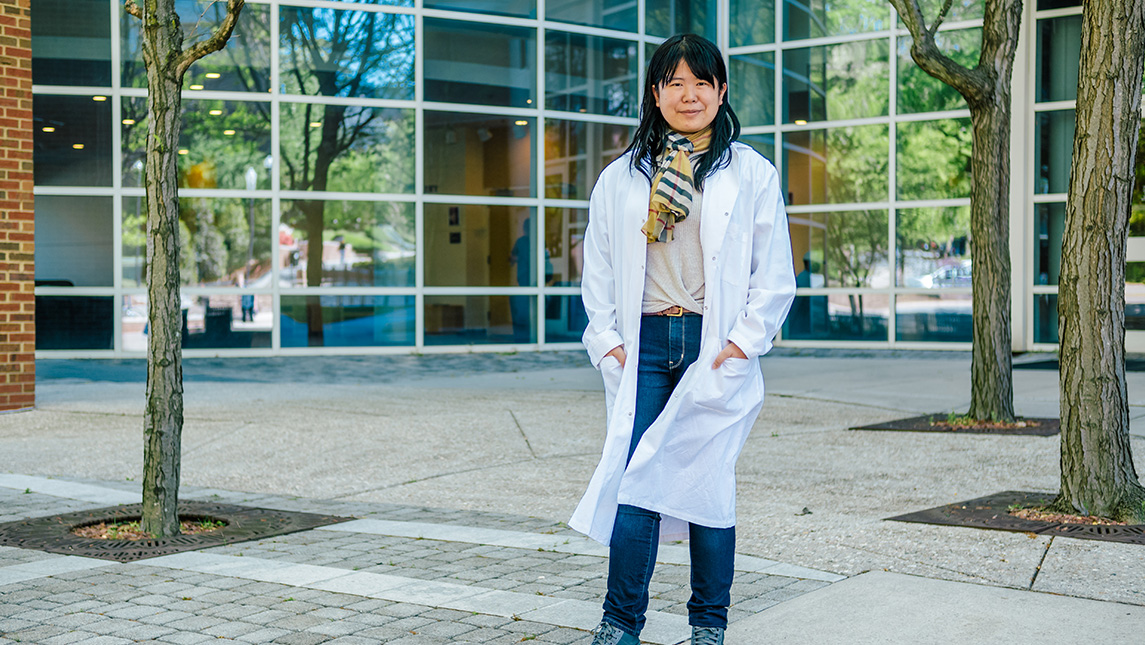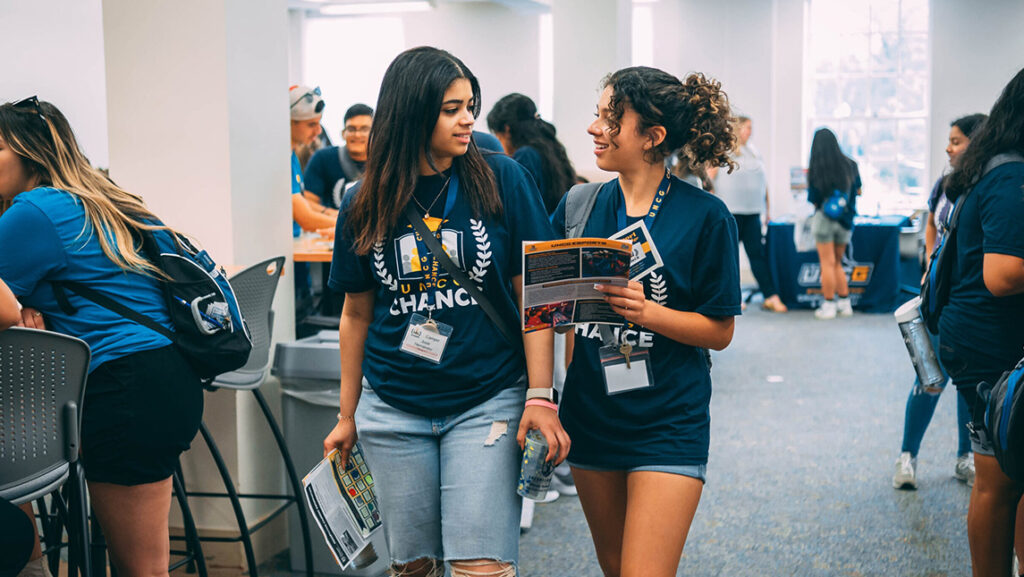Students at UNC Greensboro don’t have to wait until graduate school to form close bonds with researchers. The professors frequently take undergraduates under their wing, letting them experience all the practical work of compiling data in the lab and even publishing in academic journals.
Lee Phillips, director of the Undergraduate Research, Scholarship and Creativity Office (URSCO), says students get to be part of the development of knowledge across their preferred professional field.
“Research or scholarship takes place in every discipline. Training students in the approaches to understanding new areas, creating new knowledge, creating new expressions of knowledge and understanding through the arts, is valuable.”
Some of these Spartans shared how they met the mentors who helped steer them toward their dream academic tract or career path.
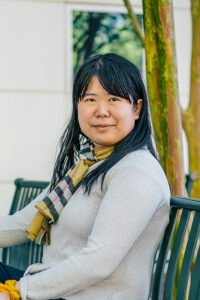
RUNZI LI
MAJOR: Chemistry
MENTOR: Dr. Shabnam Hematian
Runzi Li picked her undergraduate major based on her goal to go to medical school, but it was at UNCG where she discovered the joy of lab research. “We worked with a lot of colorful solutions, since we were using metals. I fell in love with inorganic chemistry.” She is now getting her master’s in chemistry. Her advisor Dr. Shabnam Hematian was a perfect match. They worked on two papers together on manganese and copper. The effort required to get a paper published, Li learned, is “not just hands-on work. It’s a lot of reading what other people have done.”
Li is happy in many learning environments. “I love open discussions in a classroom setting. An environment where everyone speaks their mind and a free exchange of ideas.” She was inspired by Hematian’s ability to multitask the obligations as a lecturer, a supervisor, and a principal investigator. “Since my career goals have shifted, I’m most grateful for the research experience.” Having her name on a paper as an undergrad, she says, was “a nice bonus.”
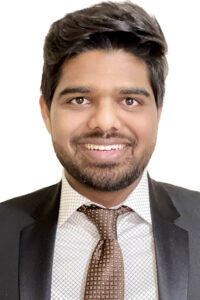
SACHIN DUMBARE
MAJOR: Biology & Biotechnology
MENTOR: Dr. Nicholas Oberlies & Dr. Karen Katula
Sachin Dumbare ran a pharmacy in India. Wanting to learn more about the pharmaceutical and vaccine process, he came to the United States to study. “I like to be in the lab and in the field,” he says. “Whenever I’m free, I go to the lab.” A teaching assistant arranged a meeting with Dr. Nicholas Oberlies. “I was so impressed with his research papers, and then I saw the work done by him, and so efficiently.”
He was thrilled at working in the lab, extracting materials for Dr. Oberlies and later working on Dr. Karen Katula’s osteogenesis research. He had easy access to and training with the methods of gathering information – mass spectrometry, nuclear magnetic resonance spectroscopy, liquid chromatography, and more.
As he watched Dr. Karen Katula study cell biology, he came to appreciate what he and his classmates could be capable of doing one day. “We students weren’t able to count all the cells in our first go, but she was so quick with her hands.” Oberlies and Katula also taught Dumbare about maintaining a healthy balance in work and life. He remembers Oberlies telling him, “Your mind and body should be stable. If you work too long, you may become tired and make mistakes.” Dumbare’s goal is to work for a pharmaceutical or biology company after graduation.
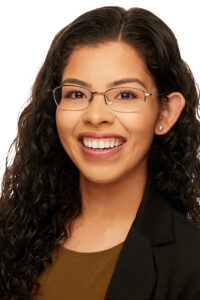
ISA RAMOS-CASTILLO
MAJOR: Nutrition
MENTOR: Dr. Jigna Dharod
Dr. Jigna Dharod was looking for a bilingual student to work with Spanish-speaking participants in a study on infant nutrition, so she reached out to Isa Ramos-Castillo. It suited Ramos-Castillo’s personal goal to bring more diversity into the nutrition field and fill the gaps in our overall knowledge about health. “As a future dietitian, I want to bring culturally relevant nutrition to patients and clients,” she says.
Working in undergraduate research is enriching, she says, and studying with Dharod for three years motivated her to continue with the program. “I loved her professionalism, dedication, determination, her passion for a very important topic. I learned that if you’re passionate about something then it will show in your work.” Ramos-Castillo is now completing an internship and is mentoring undergrads. “I’m giving back, not only to the students, but to the community. I’ve overall had a great experience, especially at the nutrition department. I always felt supported.”
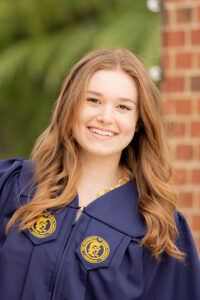
MADISON LOUDERMILT
MAJOR: Nutrition
MENTOR: Dr. Steve Fordahl
Madison became interested in nutrition when it came to her own diet and health in high school. After enrolling in biology and discovering UNCG’s nutrition program, she contacted several professors to find the lab that was right for her and says she “instantly clicked” with Dr. Steve Fordahl. “I really liked the atmosphere. It’s such a focused environment. Everyone’s on the same path, getting ready for a test or writing a thesis or dissertation. It’s very easy to sit down and focus.”
Loudermilt worked with mice to study dopamine chemistry in the brain, and how a high-fat diet might impact brain inflammation. She was surprised by the news that her research earned her a credit on Dr. Fordahl’s published research. The work helped her appreciate the importance of never giving up. “Troubleshooting, getting everything to work, gathering data, looking at data, packaging it. I’ll never forget when I got this whole protocol to work after several failures, and finally got beautiful data out of it. I felt ecstatic.” Loudermilt is now getting her master’s in nutrition.
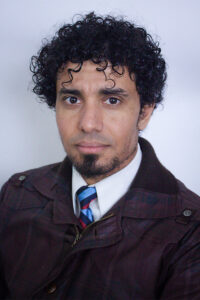
OMAR JASIM
MAJOR: Biochemistry
MENTOR: Dr. Nicholas Oberlies
When Omar Jasim transferred to UNCG, his advisor recommended he join a lab, so he asked his professor, Dr. Nicholas Oberlies, if he could help with his research on fungi. He was impressed by Oberlies’ approachableness, as well as his advice about achieving your best and the ethical requirements of research. “Dr. Oberlies asked us, ‘Why do we do research?’ And the answer is to put all this knowledge out there. That’s the goal behind it.”
Jasim was also grateful for the opportunity to work alongside graduate students and see what Oberlies’ collaborations with other Universities. “They all work hand in hand,” Jasim says. “They all help each other. Working with them motivates me. As I’m getting more peeks into the field and what they do, it gives me a passion about what I want to do.”
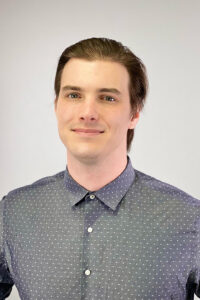
GRANT KOHER
MAJOR: Biology and human biology
MENTOR: Dr. Zhenquan Jia
What struck biology student Grant Koher about working with Dr. Zhenquan Jia was his patience and accessibility. “He’ll tell you that it’s okay to reach out to him after 7:00 p.m. or on the weekends,” he says. “The lab is his priority.” Grant, wanting to add some lab experience to his resume before applying to become a physician’s assistant, was encouraged to reach out to Jia.
Koher won an Undergraduate Research and Creativity Award for his proposal on the mamaki, a plant with potential anti-inflammatory properties that they’ve been studying with the University of Hawaii. Koher says the lab experience surpassed his expectations. “If anyone asks what lab they should work in, and they want to do biology, I definitely recommend him. He’s one of, if not the, best mentor and instructor I had.”
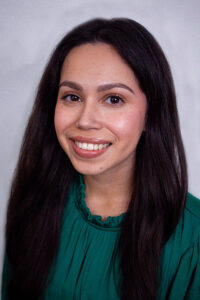
MARLEN HERNANDEZ
MAJOR: Nutrition
MENTOR: Dr. Jigna Dharod
Marlen Hernandez experimented with pre-nursing and public health, but nutrition was where she wanted to be. “I love being out in the clinical setting, getting to talk to patients.” In her last year as an undergraduate in 2019, Dr. Jigna Dharod invited her to study infant feeding and nutrition. “My research focused on the addition of infant cereal into formula bottles,” says Hernandez. “A lot of different papers came out of that one study.” She also learned the writing process, and the unique requirements for different journals.
The lessons she picked up from working on a research publication would come back to guide her while writing her thesis. “At the time it may seem very hectic and overwhelming. That can come up throughout education. I always center myself when I feel overwhelmed and say, ‘I’m going to get through it.'” She is now wrapping up her dietetic internship and clinical rotation. She says Dharod helped her chart a post-undergraduate path. “I couldn’t have asked for a better journey. I feel so much more knowledgeable and confident.”
“Most of our faculty got involved in some form of research or inquiry when they were undergraduates,” says Phillips. “One of the things they liked was the relationship they developed with their mentor. We want to be able to hand that off to our students. We want them to feel the same level of importance and guidance that we received.”
URSCO regularly highlights the work of students and faculty in all avenues of research, including humanities and the arts. Their work can be found on the URSCO blog. Students’ contributions to scientific inquiry are also featured in the UNCG Research Magazine.
Story by Janet Imrick, University Communications
Photography by Sean Norona, University Communications
Additional photography courtesy of UNCG students
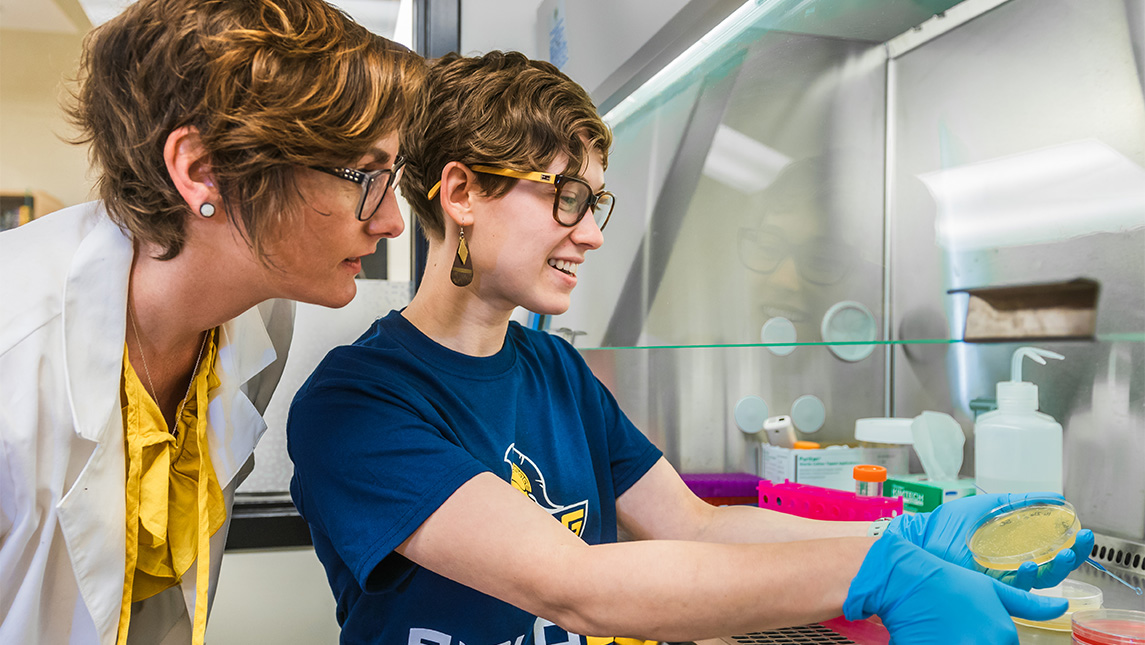
Work with the experts. Discover solutions.
